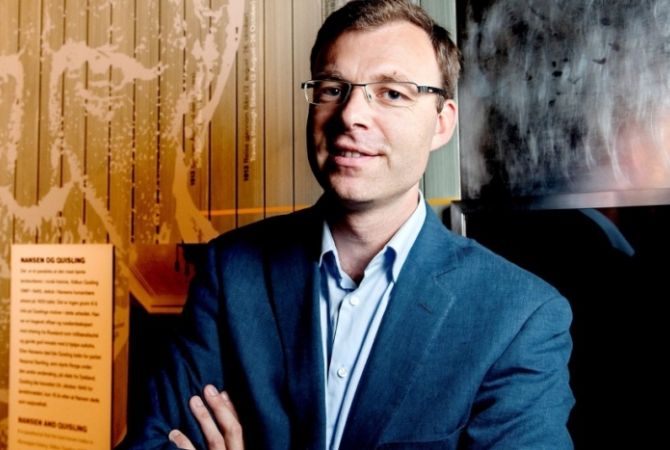‘Norway should name the organized murder of Armenians what it really was: a genocide’ – historian Carl Emil Vogt
 15:26, 25 April 2017
15:26, 25 April 2017YEREVAN, APRIL 25, ARMENPRESS. Norwegian foreign policy tends to be extremely careful, however, considering the political developments in Turkey it is possible Norway will change its stance on the Armenian Genocide, Norwegian historian Carl Emil Vogt said in an interview with Armenpress who is convinced that Norway should name the organized murder of Armenians what it really was: a genocide.
-As a scientist, you have deeply studied the life and activity of great Norwegian humanitarian Fridtjof Nansen, you published a book about him. Which episode on his activity or memories related with Armenians mostly impressed you?
-When it comes to Fridtjof Nansen, I am always impressed by his ability to relate to people he met on his expeditions. He visited Armenia in 1925 as head of the League of Nations fact-finding commission to investigate possibilities to settle 50 000 Armenian refugees in the Soviet Republic of Armenia. Then he met with villagers who told him of the cruel atrocities they had suffered. Nansen's reaction was strong. He wrote: "Has any people in any part of the world suffered like this one has done? And to what end? To be deserted and betrayed at last by those who gave it such precious and binding promises in the sacred name of justice?"
-Norway till now refuses to recognize the Armenian Genocide. How would you explain your country’s such stance?
-Norway has refused to recognize the Armenian Genocide. This has obviously to do with the Norwegian membership in NATO where Turkey is an important member. I am of course of the opinion that Norway should name the organized murder of Armenians what it really was: a genocide. It is possible that the political development in Turkey in the nearest future will make this easier for a new Norwegian government. But I doubt it, unfortunately. Norwegian foreign policy tends to be extremely careful, to put it politely.
-Although more than a century has passed since the first Genocide of the 20th century, today as well new groups of people from different parts of the world are being killed for religious, ethnic or national belonging. As a historian, how would you comment on the phenomenon of repetition of such events in different periods of the history?
-The repetition of genocides or crimes against humanity is sad. Lately we have seen the so-called Islamic State attempts to eradicate the entire Yazidi population. I would say that we have to work steady and hard that such mass-killings should never ever occur on a large scale again. The term genocide is however less used in international law now, it is easier to persecute perpetrators for "crimes against humanity". Maybe this is something to reflect upon for Armenians as well? I reiterate of course that I strongly support the use of the term the Armenian Genocide.
-Are you preparing a new work that will have a reference also to Armenians?
-Unfortunately I am not preparing a new work with reference to Armenians now. At the time I work on a book on the fate of the very small Norwegian Roma minority (formerly called gypsies), many of whom died in Auschwitz during World War II. That so many Norwegian Roma died during the Holocaust is not well known in Norway. The survivors were not let into Norway until 1956 when they had their passports back. This is not a proud story for Norway. I do this work together with historians Lars Lien, Jan Brustad and Maria Rosvoll, my colleagues at the Norwegian Center for Studies of Holocaust and Religious Minorities in Oslo.
-During your research have you made any discovery or revealed an exclusive episode that you can share with the Armenian reader and which can have a unique impact on the international recognition of the Genocide?
-I must say I have not discovered anything that can really have an impact on the international recognition of the Genocide. But I strongly think that everybody should study the personal life and academic work of the man Raphael Lemkin who coined the term genocide. It was a reaction to the fact that there was a word for the crime of killing a human being, but not a word for killing one million people - no one was even tried for it in court. The reason why he became interested in this was the Armenian Genocide. He also later more or less personally convinced the member states and the Secretariat of the United Nations to engage in these atrocities. He himself wrote the UN Genocide Convention.
-I know that you visited Armenia in 1999 and were greatly impressed that Fridtjof Nansen is remembered in Armenia, his memory is respected in our country. Do you plan to visit Armenia in near future?
-Yes, I loved my visit to Armenia, a beautiful country, so rich in history, culture and nature. I was really impressed by how Armenians preserve the memory of Fridtjof Nansen. I have no definite plans to visit Armenia, but I would love to go there one more. As my grandfather, the linguist Hans Vogt, was a specialist of Caucasian languages and read old Armenian, I also have plans to visit neighboring Georgia. Perhaps I would do a trip in Nansen's footsteps. After all "Through the Caucasus to the Volga" was the title of his book published in English one year after Nansen's death in 1930.
Interview by Araks Kasyan





















